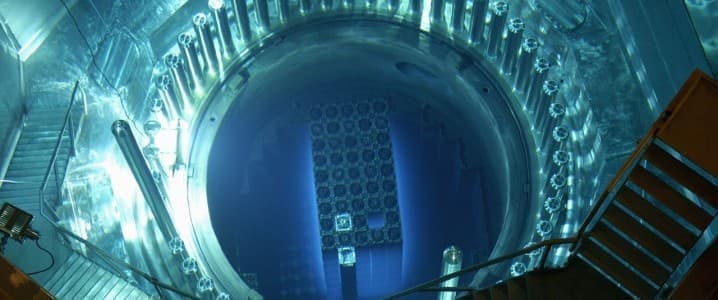Business
Hype Surrounding Small Nuclear Reactors May Not Deliver

The growing enthusiasm for Small Modular Reactors (SMRs) in energy policy circles may not translate into the expected benefits. Across major nations, including the United States, Canada, and the United Kingdom, these compact nuclear units are being marketed as solutions to meet rising energy demands, particularly from data centers and artificial intelligence. However, significant challenges remain that could hinder their implementation.
SMRs are being promoted as revolutionary advancements in nuclear technology, often compared to the iPhone for their supposed efficiency and scalability. Major companies like NuScale, Rolls-Royce, GE Hitachi, and TerraPower have outlined ambitious deployment timelines. Yet, the reality is stark: there are currently no operational commercial SMRs globally.
NuScale’s flagship project in Utah faced a setback when costs soared to over $9,000 per kilowatt, leading to its cancellation. The company’s CEO acknowledged that no deployments would occur before 2030. Similarly, Rolls-Royce’s factory for SMRs has yet to produce any output, raising questions about the viability of these projects.
Challenges in Large-Scale Nuclear Projects
The issues plaguing SMRs are reflective of broader challenges within the nuclear sector. Large-scale projects, such as the UK’s Hinkley Point C, have been marred by delays and escalating costs. Originally estimated at £23 billion, the project has now ballooned to over £46 billion and is at least five years behind schedule. Similar complications have been observed in the construction of EPR reactors in France and Finland, where projects have taken significantly longer than projected and incurred substantial cost overruns.
In France and Finland, authorities have resorted to guaranteeing minimum prices for new nuclear power, essentially providing financial safety nets for operators. In Finland, for instance, a recent agreement set a price floor above €90/MWh for the next 20 years. This contrasts sharply with the significantly lower prices achieved through solar and wind energy, which often clear wholesale auctions at rates between €30 and €50/MWh.
The Future of Energy Transition
Assuming the best-case scenario for SMRs, where designs receive regulatory approval by 2028 and construction begins in the early 2030s, the world would still need to construct thousands of these reactors to make a meaningful impact on fossil fuel consumption. This poses a logistical challenge that is compounded by issues such as public acceptance, licensing delays, uranium supply, and waste management concerns.
The deployment of solar, wind, and battery storage technologies offers a more immediate and cost-effective solution. These alternatives have already proven successful in various environments, from remote areas in Australia to urban settings in Germany and California.
Nuclear energy, while statistically safe per kilowatt-hour, carries unique risks that make it less attractive compared to renewable options. The potential for catastrophic failure and the long-term waste management issues associated with nuclear power present significant drawbacks.
As the world grapples with the urgency of climate action, investments must be directed toward technologies that deliver maximum emissions reductions efficiently. Although nuclear power may continue to play a role in specific regions, particularly where existing infrastructure supports it, SMRs are unlikely to be the transformative solution that advocates envision.
In conclusion, while the concept of Small Modular Reactors is intriguing, they are positioned more as a niche solution rather than a leading force in the global energy transition. As the industry pushes for advancements, it is critical to focus on proven technologies such as wind, solar, and energy storage systems, which are already making tangible contributions to decarbonization efforts.
-

 Science4 months ago
Science4 months agoToyoake City Proposes Daily Two-Hour Smartphone Use Limit
-

 Top Stories4 months ago
Top Stories4 months agoPedestrian Fatally Injured in Esquimalt Collision on August 14
-

 Health4 months ago
Health4 months agoB.C. Review Reveals Urgent Need for Rare-Disease Drug Reforms
-

 Technology4 months ago
Technology4 months agoDark Adventure Game “Bye Sweet Carole” Set for October Release
-

 World4 months ago
World4 months agoJimmy Lai’s Defense Challenges Charges Under National Security Law
-

 Lifestyle4 months ago
Lifestyle4 months agoVictoria’s Pop-Up Shop Shines Light on B.C.’s Wolf Cull
-

 Technology4 months ago
Technology4 months agoKonami Revives Iconic Metal Gear Solid Delta Ahead of Release
-

 Technology4 months ago
Technology4 months agoApple Expands Self-Service Repair Program to Canada
-

 Technology4 months ago
Technology4 months agoSnapmaker U1 Color 3D Printer Redefines Speed and Sustainability
-

 Technology4 months ago
Technology4 months agoAION Folding Knife: Redefining EDC Design with Premium Materials
-

 Technology4 months ago
Technology4 months agoSolve Today’s Wordle Challenge: Hints and Answer for August 19
-

 Business4 months ago
Business4 months agoGordon Murray Automotive Unveils S1 LM and Le Mans GTR at Monterey









